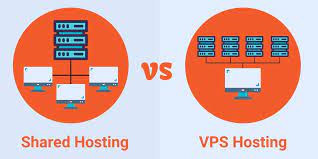When it comes to web hosting, one size does not fit all. The choice between shared, VPS (Virtual Private Server), and dedicated hosting depends on your website’s size, traffic, technical requirements, and budget. Let’s explore the key differences and considerations for each hosting type.
Shared Hosting
- What is it? Shared hosting is the most basic and cost-effective hosting option. Multiple websites share resources on a single server, including CPU, RAM, and storage.
- Best For: Small websites, blogs, and personal sites with low traffic.
- Pros:
- Affordability: It’s the cheapest option.
- Easy to manage: The hosting provider handles server maintenance.
- Suitable for beginners with minimal technical knowledge.
- Cons:
- Limited resources: Sharing resources can lead to slower loading times.
- Less control: You have limited control over server configurations.
- Not suitable for high-traffic or resource-intensive websites.
VPS Hosting
- What is it? VPS hosting offers a balance between shared and dedicated hosting. It involves a single physical server divided into multiple virtual servers, each with its own dedicated resources.
- Best For: Small to medium-sized businesses, e-commerce sites, and websites with moderate traffic.
- Pros:
- More resources: VPS provides dedicated resources for your site.
- Scalability: You can easily upgrade resources as your site grows.
- Greater control: You have more control over server configurations.
- Cons:
- It costs more than shared hosting but less than dedicated hosting.
- Requires some technical knowledge for server management.
Read here: Why You Should Use VPS Hosting?
Dedicated Hosting
- What is it? With dedicated hosting, you rent an entire physical server exclusively for your website. This provides complete control and dedicated resources.
- Best For: Large businesses, high-traffic websites, e-commerce sites, and applications with demanding resource needs.
- Pros:
- Maximum performance: Dedicated resources ensure top-notch speed and performance.
- Full control: You have complete control over server settings and configurations.
- High security: Enhanced security measures are possible with dedicated hosting.
- Cons:
- Expensive: Dedicated hosting is the costliest option.
- Requires advanced technical expertise for server management.
Choosing the Right Hosting Type
- Consider Your Website’s Needs: Assess your website’s size, traffic, and resource requirements. A small personal blog will likely thrive on shared hosting, while an e-commerce site with heavy traffic may need VPS or dedicated hosting.
- Budget: Determine how much you can allocate to hosting. Shared hosting is the most budget-friendly, while dedicated hosting is the most expensive.
- Technical Expertise: Evaluate your technical skills and willingness to manage server configurations. Shared hosting is beginner-friendly, while dedicated hosting demands advanced knowledge.
- Scalability: Plan for the future. If you expect growth, consider a hosting option that allows for easy resource upgrades.
In summary, shared hosting is great for beginners and small websites on a tight budget. VPS hosting offers a middle-ground solution with more control and resources. Dedicated hosting provides top-tier performance and is suitable for resource-intensive websites. The right choice depends on your specific needs and circumstances.




